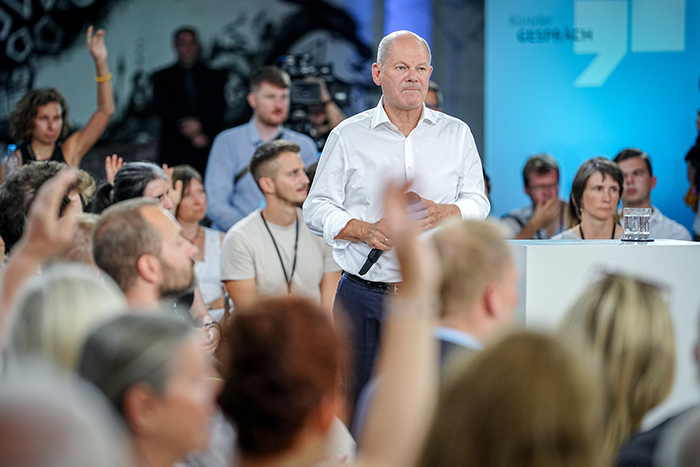Entretiens / Europe, Strategy, Security
9 September 2024
Deindustrialisation and the Rise of the Far Right: Is Germany on the Brink of Crisis?

The end of the summer saw a series of difficulties for Germany. First, Chancellor Olaf Scholz announced a freeze on military aid to Ukraine in order to save money. Then, the results of the regional elections held at the beginning of September weakened the government coalition. In the Länder of Saxony and Thuringia, in addition to the coalition’s electoral wreckage, it was above all the clear advance of the far-right Alternative for Germany (AfD) that marked a turning point. It even came first in Thuringia, something that had not happened since the end of the Second World War. Another taboo was finally broken with the announcement by the automotive giant Volkswagen, the driving force behind the German economy, of potential plant closures. Germany, the political and economic leader of the European Union, appears particularly destabilised. To the point of faltering? Jacques-Pierre Gougeon, university professor and director of research at IRIS, and author of ‘L’Allemagne, un enjeu pour l’Europe’ (Eyrolles, 2024), takes stock of the situation.
Volkswagen and other major groups have announced the possibility of closing plants in Germany. What are the causes of this crisis? Is Germany in danger of losing its status as the nerve centre of European industry?
The announcement by Volkswagen’s management of the possible closure of the group’s sites in Germany was a real wake-up call in Germany, even if the decision has not yet been definitively adopted, as the unions – very powerful because of the co-determination system – have indicated that they intend to oppose it. The announcement by this pillar of German industry is all the more symptomatic given that the automotive industry is the embodiment of Germany’s industrial power, accounting alone for 4.7% of GDP, 16% of exports and 48% of the country’s industrial research. While Volkswagen is still suffering in terms of image from the aftermath of the diesel emissions fraud scandal, the current situation of the industrial group is indicative of the difficulties facing certain parts of the German economy. Industry, which accounts for 21% of GDP (compared with 11% in France), is in the front line, having suffered an explosion in energy costs (and consequently in production costs) and is overexposed to the ups and downs of the international situation. Moreover, Germany is one of the most open economies in the world, and even the most open of the G7 countries. The importance of foreign trade is reflected in its share of national wealth, at 67%. However, this extreme dependence on the outside world, which is generally a strength, is also proving to be a weakness, at a time when major countries such as the United States, Germany’s second largest trading partner, are increasingly resorting to protectionist measures. In the case of the automotive industry, dependence on China, Germany’s biggest trading partner, is proving problematic when Germany has a high level of ‘over-capacity’ encouraged by state subsidies, even though – and this is the dilemma – Volkswagen generates 37% of its sales in China and BMW 32%. This close interweaving of the two economies has even been denounced by some manufacturers themselves. Over time, China has become Germany’s main competitor in sectors that we all share: cars, machinery, electronics and chemicals. With the twin crises of the Covid-19 pandemic and the war in Ukraine, Germany is questioning its economic model, which until now has been based on importing cheap raw materials and exporting high value-added goods. Nevertheless, the structure of the German economy remains a virtually unique force in Europe in terms of its industrial strength, dense fabric of solid, numerous small and medium-sized enterprises and high level of innovation.
Are the historic score of the far-right Alternative für Deutschland (AfD) party and the debacle of the government parties in two provinces of the former East Germany, Thuringia and Saxony, linked to the country’s economic difficulties? What issues are dominating political debates across the Rhine?
Until then, the Alternative for Germany (AfD) had achieved its best result in 2019, in Saxony, with 27.7% of the vote. This time around, the party actually achieved impressive results, with 32.8% in Thuringia and 30.6% in Saxony. In the former case, the AfD is even the leading party, followed by the CDU with 23.6%. This is the first time in German history since 1949 that a party labelled ‘far right’ by the Office for the Protection of the Constitution has come out on top in an election. At the same time, the parties in government collapsed, with the Social Democrats in Thuringia and Saxony at 6.1% and 7.3% respectively. The Liberals no longer even have any representatives in these regional parliaments. Admittedly, no other party is considering forming a coalition with the AfD, but the party’s high profile is a cause for concern, especially as an analysis of the profile of AfD voters shows that more and more of them are voting not just out of disappointment but out of conviction. In 2014, 37% of AfD voters in the same elections voted out of conviction; by 2024, the figure had risen to 52%. The AfD is also ranked first in these elections in terms of competence on immigration, the defence of East German interests and social policy. Even though economic and social convergence between the two parts of Germany has progressed, with, for example, per capita GDP in the East at 79.5% of the level in the West (compared with 32% in 1991) and disposable income at 85% of the level in the West (compared with 37% in 1991), a malaise persists. For example, 63% of East Germans still feel that they are treated as ‘second-class citizens’. This feeling is fuelled by the fact that although East Germans account for 19.5% of the total German population, they occupy only 2% of senior positions and 6% of management positions in the federal administration, the judiciary, the media, academia/science and business. General dissatisfaction with the government has of course also played a role, as it is constantly torn publicly on major issues such as the energy transition, the financing of social policy and budgetary guidelines, issues that will continue to dominate the debate until the next federal elections in September 2025. Support for Ukraine is also divisive.
With Berlin having already announced a freeze on military aid to Kyiv, can the AfD’s political momentum influence German policy on the war in Ukraine?
The Chancellor’s announcement of a reduction in aid to Ukraine in 2025 is not unrelated to the regional elections that have just taken place, even if the debate in Germany goes beyond geographical divides and cuts across all political parties, particularly those on the left, led by the Social Democrats. The fact remains, however, that there is a difference of opinion between West and East. While 54% of West Germans approve of the delivery of heavy weapons to Ukraine, only 32% of East Germans share this opinion, with the lowest approval rates found among the AfD and Sahra Wagenknecht’s radical left, which also scored well in the last regional elections. Through experience, culture or education, the relationship with Russia in eastern Germany has been and still is essential, sometimes even fraternal, whereas the notion of the West appears to be too closely linked to the United States (not to mention NATO). The Chancellor has not succeeded in imposing the image he wanted to project of himself as the ‘Chancellor of Peace’. Here too, the debate will continue until the federal elections in September 2025, especially as support for the delivery of military equipment to Ukraine has fallen by 10 points in two years and support for Ukraine’s membership of the European Union by 16 points. A number of issues are already emerging for the next major elections.
Translated by Deepl

